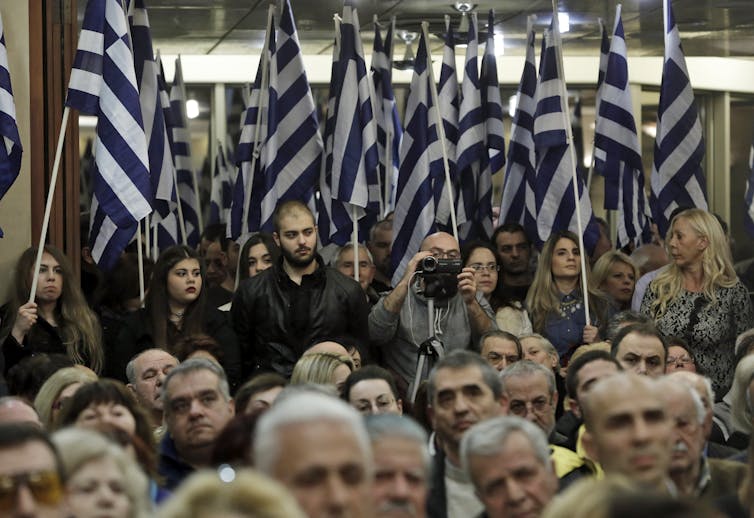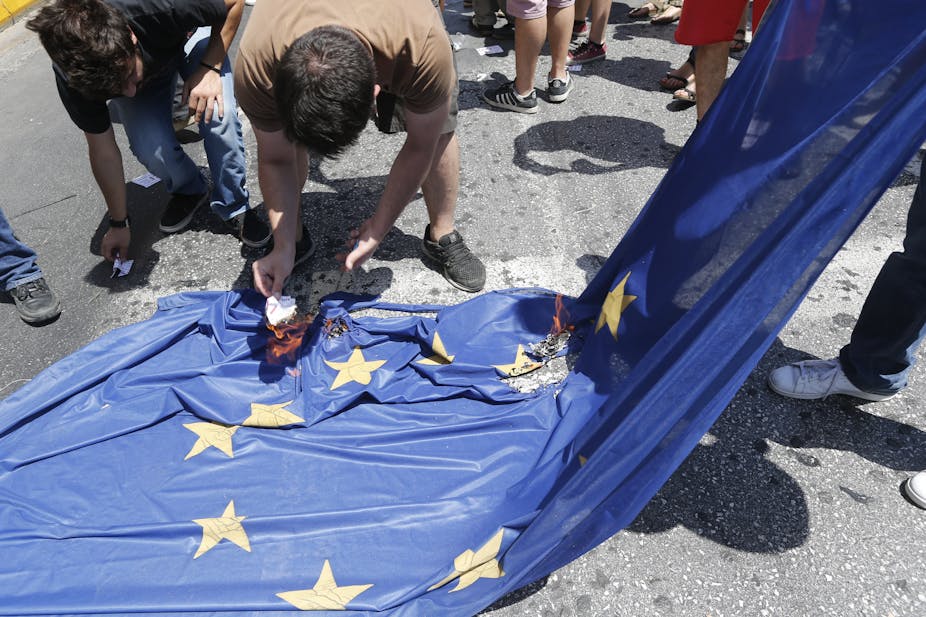Societal crises breed extremism. As political theorist Hannah Arendt has claimed, extreme groups gain momentum by offering solutions when other alternatives appear unable to “alleviate political, social, or economic misery in a manner worthy of man”.
Both the far right and the far left can be understood as the product of external triggers, such as economic crises. Parties at both extremes of the political spectrum capitalise on the insecurities of downward social mobility. They appeal to the dispossessed, the socially isolated, the economically insecure, and authoritarian persons at every level of society.
The Greek crisis is a perfect example of this phenomenon. As the country spirals towards disaster, the extreme left and extreme right find themselves singing from the same hymn sheet. But while their eurosceptic nationalism is being celebrated by many in Greece, it also poses a threat.
Rise of the extremes
Radical left coalition Syriza made a significant electoral breakthrough in 2012, coming second in the election with 26.89% of the vote. On the far right, the neo-Nazi Golden Dawn party moved from the fringes into the mainstream after winning 6.92% of the votes, giving it 18 seats in the Greek parliament.
This trend continued into the 2015 election, when Syriza and ANEL, a far-right party formed by defectors from New Democracy, formed a coalition government. Syriza had secured 36.34% of the vote and secured 149 parliamentary seats – just two seats short of what it needed to form a majority government.
Golden Dawn lost a little ground since 2012 but still managed to come third, with 6.28% of the vote. This despite the fact that the party did little campaigning and its leading members were in prison at the time of the election, facing charges of indictment.
All three parties were elected on an anti-austerity platform that emphasised the independence, dignity and sovereignty of the Greek nation. The crisis altered the cleavages of Greek society from left versus right to centre versus extreme. These three parties are now converging in their support for the campaign to reject the bailout deal being proposed by Greece’s international creditors in the referendum being held on July 5. Rejection in this vote may be interpreted as a call for Greece to leave the eurozone and even the EU.
Strange bedfellows
It may seem counter-intuitive that both the far left and the far right belong to the same camp and put forward similar ideas and solutions to the crisis but it actually makes sense.
Societal crises breed extremism when economic woes meet political turmoil – particularly when severe issues of governability limit the ability of the state to fulfil its social contract obligations.

This breach of the social contract is accompanied by declining levels of trust in state institutions, resulting in the collapse of the party system. This is what happened in Greece. The people lost faith in the ability of the state to mediate the effects of the crisis. They stopped trusting institutions, political parties and democracy more broadly. Citizens questioned the existing mechanisms of democratic representation, which gave anti-systemic parties space to offer an alternative vision.
This vision is premised on national pride, defiance and an antagonism against the status quo – which explains the convergence of the extremes. The far right and left both take an anti-establishment stance and reject the European Union on the basis that it is an exploitative power seeking to undermine the unity, autonomy and identity of the Greek nation.
Paradoxically then, nationalism is the underlying feature that unites the far right and the far left in Greece, cross-cutting traditional alignments and mobilising support across the political spectrum.
Since the eruption of the crisis, left-right polarisation has been superseded by polarisation over the demands being placed on Greece by its creditors.
The extreme versus mainstream cleavage is based around the question of whether the Greek crisis can be resolved within the confines of the eurozone or whether the people should reject European membership in order to maintain their national pride.
Decision time
The impending referendum is yet another indicator of the state’s failure to manage the crisis and implement solutions based on democratic practices. The timing of the referendum, the ballot paper itself, and the question posed, all fail international standards. The people are being pushed into answering a complicated question at very short notice, while the government has openly supported the No camp.
The most important effect of the referendum has been to further polarise an already deeply divided society. The tension between the Yes and No voters provides an opportunity for extremist parties and there is grave danger that Golden Dawn will be able to harness even further support.
History should act as a warning here. When societies have opted for extreme measures in response to crises, they have found themselves plunged into economic disaster, isolation, dictatorships and totalitarianism.
This is because for the dispossessed, the socially isolated and economically insecure who vote on the basis of anger and emotion, the extreme becomes acceptable and banal.
But their choice is often the product of a lack of reflection, information and clarity about the severity of the implications. Expecting Greek voters to provide a simple answer to an extremely complex question, within a very short period of time and without a clear plan of what comes next, deepens societal polarisation and undermines the very democratic practices a referendum is purported to promote.

